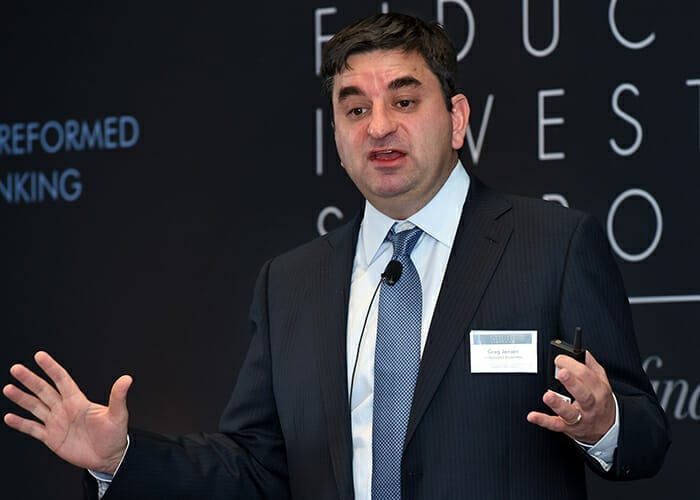There are three issues investors should be addressing in the current investment environment according to Greg Jensen, co-chief investment officer of Bridgewater Associates told delegates at the Fiduciary Investors Symposium at Yale School of Management in October.
Firstly low returns on assets have been postponed by the quantitative easing.
“But they are in there and they are coming, and coming relatively soon. Are you prepared, have you thought through the implications of that?”
Secondly there is a wide range of potential outcomes.
“Two huge pressures have collided and created low volatility in markets and a calm. These huge pressures are this secular deleveraging debt problem that’s deflationary in pushing down assets and inflation. And second the massive liquidity push by the central banks through quantitative easing, too huge forces, leading to low volatility, but that won’t continue, one way or the other, significant volatility will return. And the nature of that volatility could be pretty bad for your portfolios, so recognising this wide range of outcomes, the possibility we move down something like a Japan path, what would that be like? Or potentially that money shifts out of the massively produced, cash, low real yields assets, into alternatives and central banks have an inflation that’s not tied to growth. Are you prepared for the wide range of possibilities?”
And thirdly, with interest rates at zero, the only free market mechanism largely left is currency.
“So look at this picture of where currencies lie in your portfolio, and whether they are well managed. We expect a secular environment of currency volatility. The lesson of Brexit is a good one in terms of what the future can be like in terms of currency volatility, those that managed their currency well going into Brexit had very different outcome,” he told delegates.
Jensen says given this environment, and the fact all assets have been really overbought relative to their fundamental returns, there are three choices for investors in how they get the best out of their portfolios.
“Investors can accept lower returns. Accept your portfolio will get 3-3.5 per cent and deal with the consequences of that,” he said.
Secondly investors can take more risk, a scenario he says Bridgewater is “nervous about”.
“We see people moving into assets they will think will get their return targets even though those assets are flooded with liquidity and are dangerous. They are moving up the risk curve and into more growth and equity sensitive assets. This makes us nervous given the environment, and the fact we are at something like peak liquidity.”
And thirdly, the most preferred option is to take risk more efficiently. Jensen recommended that investors do a strategic review of how they’re taking risk, and think through whether it is as efficient as possible given the secular environment and range of potential outcomes.
“People have extremely biased beta, they are invested in assets that will do well if growth is better than expectations and inflation is low but not negative,” he says.
“All assets have cash in them, and cash is zero for all assets. Historically assets that gave you 8 per cent had an excess return on cash of 2-3 per cent. Now we have zero on cash and those assets that used to give 8 per cent now give 2-3 per cent. The excess return relative to cash now is at best normal, so 2-3 per cent, but probably worse than normal. So beta is difficult,” he says.
“For us in terms of taking risk more efficiently, the most important part of that is to balance your beta to deal with the wide range of outcomes, to deal with the outcome that US and Europe might look like Japan, which has had negative equity returns since the 1990s and bonds going to zero. Or there is an environment where inflation is priced very low, and money leaves cash as a store of wealth, creates an inflation with re-growth. Both of those environments would be devastating for most portfolios in this room.”
Jensen also acknowledged that alpha is very difficult to find, but if you can find true alpha managers which don’t get returns from beta it can be very additive in a low beta world.
“There will be people who understand markets better than it is priced in. And thinking through alpha that will do well in the case that beta does poorly. What ways can you improve that outcome with alpha managers? And find managers that are uncorrelated to beta or even better structurally negatively because they are taking advantages of opportunities that will do well if beta does poorly.”




